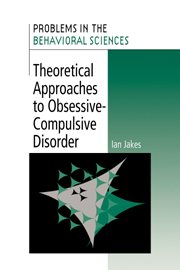Book contents
- Frontmatter
- Contents
- Dedication
- Synopsis of Theoretical approaches to obsessive-compulsive disorder
- Acknowledgments, and provenance of Theoretical approaches to obsessive-compulsive disorder
- 1 The natural history and definition of obsessive-compulsive disorder
- 2 Behavioural/learning accounts of OCD
- 3 Accounts of OCD based upon personality theories derived from the work of Pavlov
- 4 Janet on OCD
- 5 Psychodynamic approaches to OCD
- 6 Cognitive style/deficit approaches to OCD
- 7 Biological approaches to OCD
- 8 Concluding remarks
- References
- Author index
- Subject index
6 - Cognitive style/deficit approaches to OCD
Published online by Cambridge University Press: 07 May 2010
- Frontmatter
- Contents
- Dedication
- Synopsis of Theoretical approaches to obsessive-compulsive disorder
- Acknowledgments, and provenance of Theoretical approaches to obsessive-compulsive disorder
- 1 The natural history and definition of obsessive-compulsive disorder
- 2 Behavioural/learning accounts of OCD
- 3 Accounts of OCD based upon personality theories derived from the work of Pavlov
- 4 Janet on OCD
- 5 Psychodynamic approaches to OCD
- 6 Cognitive style/deficit approaches to OCD
- 7 Biological approaches to OCD
- 8 Concluding remarks
- References
- Author index
- Subject index
Summary
Reed's account
Reed's hypothesis of the central problem
A number of authors (for example, Beech and Perigault, 1974; Beech and Liddell, 1974; Carr, 1974; Volans, 1974, 1976; Reed, 1985, 1991) have suggested that a generalised cognitive style or deficit in OCD sufferers may be responsible for the occurrence of OCD symptoms. Reed's ideas represent the most fully worked out contribution from this school. He advances what he terms a “cognitive-structural approach” (Reed, 1985) to explain both the obsessional personality (and personality disorder) and OCD. In what follows, the term obsessional will be used generically, as it is by Reed, to cover OCD, the obsessional personality/personality disorder, and the person who exhibits either of these. Unlike many of the approaches discussed in other chapters of this book, Reed's account has not been subject to widespread critical discussion; particularly detailed consideration of this account is therefore offered here.
What, then, is the central problem in obsessional disorders, according to Reed? His attempts to answer this question in just a few words tend to be a little cryptic. For example, he suggests that obsessional traits and symptoms reflect difficulties in “spontaneous categorizing and integration” (1985, p. 220) leading to attempts to compensate for these difficulties by “the artificial over-structuring of input, of fields of awareness, of tasks and situations” (p. 220); there is, he argues, a “maladaptive over-defining of categories and boundaries” (1969b, p. 787). Reed states that the central phenomenon of these disorders “may thus be seen as a striving towards boundary fixing or the setting of limits in the cognitive/ perceptual modalities” (1985, p. 220).
- Type
- Chapter
- Information
- Theoretical Approaches to Obsessive-Compulsive Disorder , pp. 102 - 135Publisher: Cambridge University PressPrint publication year: 1996



